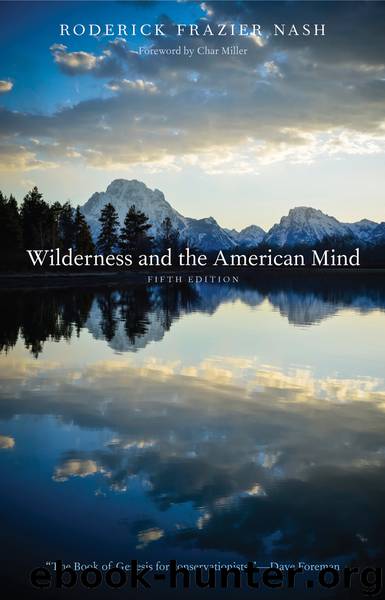Wilderness and the American Mind by Nash Roderick Frazier. & Char Miller

Author:Nash, Roderick Frazier. & Char Miller
Language: eng
Format: epub
Publisher: Yale University Press
Published: 2014-04-12T04:00:00+00:00
CHAPTER 12
Decisions for Permanence
There is just one hope of repulsing the tyrannical ambition of civilization to conquer every niche on the whole earth. That hope is the organization of spirited people who will fight for the freedom of the wilderness.
Robert Marshall, 1930
FOLLOWING the Hetch Hetchy setback in December 1913 and the death of John Muir a year later, wilderness preservation rallied strongly. New leaders such as Aldo Leopold, Robert Marshall, Sigurd Olson, Howard Zahniser, and David Brower, along with new organizations, notably the Wilderness Society, took up the crusade. They benefitted from careful reformulations of the rationale for the continued existence of wild country in modern civilization as well as from a firmer grasp of the techniques of influencing the political process. But their efforts would have been fruitless without the responsive chords they struck throughout American society. Public appreciation of wilderness increased steadily as the nation’s pioneer past receded, and the promise of the wilderness cult and the Hetch Hetchy protest was fulfilled in a series of successful defenses of wild regions. The most important blocked construction of Echo Park Dam in Dinosaur National Monument and, in effect, reversed the Hetch Hetchy verdict. The Echo Park victory also gave preservationists the momentum necessary to launch a campaign for a national policy of wilderness preservation. Its establishment under the Wilderness Act of September 3, 1964, did not end the conflict between wilderness values and those of civilization, as the climactic struggle over dams in the Grand Canyon proved. But the Wilderness System did accord wild country unprecedented national recognition as a desirable component of the American landscape.
“As a boy,” recalled Robert Marshall, “I spent many hours in the heart of New York City, dreaming of Lewis and Clark and their glorious exploration into an unbroken wilderness. Occasionally,” he added, “my reveries ended in a terrible depression, and I would imagine that I had been born a century too late for genuine excitement.”1 In part, of course, he was right. The wilderness Lewis and Clark knew vanished long before his birth in 1901. But Marshall underestimated his own spirit. Although he died at thirty-eight, he not only found excitement in abundance but confronted a challenge equal to Lewis and Clark’s: the retention of wilderness in an expanding American civilization.
Marshall is a case in point of the tendency of wilderness enthusiasts to arise from refined, urban situations. The family lived in New York City, where Louis Marshall’s practice of constitutional law placed him among the renowned and wealthy of his time. The Marshalls also owned a comfortable “camp” on Lower Saranac Lake in the heart of northern New York’s Adirondack region, and Bob spent his first twenty-one summers at “Knollwood.”2 From his vacationer’s point of view the surrounding wilderness meant delight, not hardship or terror. He jumped at the chance to explore the mountains, and in the company of his brother George and a guide climbed all the surrounding peaks higher than four thousand feet—a total of forty-six.3 It was typical of Marshall not to be content with half loaves.
Download
This site does not store any files on its server. We only index and link to content provided by other sites. Please contact the content providers to delete copyright contents if any and email us, we'll remove relevant links or contents immediately.
The Lonely City by Olivia Laing(4802)
Animal Frequency by Melissa Alvarez(4474)
All Creatures Great and Small by James Herriot(4322)
Walking by Henry David Thoreau(3962)
Exit West by Mohsin Hamid(3828)
Origin Story: A Big History of Everything by David Christian(3692)
COSMOS by Carl Sagan(3625)
How to Read Water: Clues and Patterns from Puddles to the Sea (Natural Navigation) by Tristan Gooley(3469)
Hedgerow by John Wright(3363)
How to Read Nature by Tristan Gooley(3341)
The Inner Life of Animals by Peter Wohlleben(3319)
How to Do Nothing by Jenny Odell(3302)
Project Animal Farm: An Accidental Journey into the Secret World of Farming and the Truth About Our Food by Sonia Faruqi(3221)
Origin Story by David Christian(3202)
Water by Ian Miller(3188)
A Forest Journey by John Perlin(3077)
The Plant Messiah by Carlos Magdalena(2935)
A Wilder Time by William E. Glassley(2863)
Forests: A Very Short Introduction by Jaboury Ghazoul(2842)
